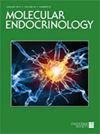Roles of Estrogen Receptor-α and the Coactivator MED1 During Human Endometrial Decidualization.
Q Biochemistry, Genetics and Molecular Biology
引用次数: 27
Abstract
The steroid hormones 17β-estradiol and progesterone are critical regulators of endometrial stromal cell differentiation, known as decidualization, which is a prerequisite for successful establishment of pregnancy. The present study using primary human endometrial stromal cells (HESCs) addressed the role of estrogen receptor-α (ESR1) in decidualization. Knockdown of ESR1 transcripts by RNA interference led to a marked reduction in decidualization of HESCs. Gene expression profiling at an early stage of decidualization indicated that ESR1 negatively regulates several cell cycle regulatory factors, thereby suppressing the proliferation of HESCs as these cells enter the differentiation program. ESR1 also controls the expression of WNT4, FOXO1, and progesterone receptor (PGR), well-known mediators of decidualization. Whereas ESR1 knockdown strongly inhibited the expression of FOXO1 and WNT4 transcripts within 24 hours of the initiation of decidualization, PGR expression remained unaffected at this early time point. Our study also revealed a major role of cAMP signaling in influencing the function of ESR1 during decidualization. Using a proteomic approach, we discovered that the cAMP-dependent protein kinase A (PKA) phosphorylates Mediator 1 (MED1), a subunit of the mediator coactivator complex, during HESC differentiation. Using immunoprecipitation, we demonstrated that PKA-phosphorylated MED1 interacts with ESR1. The PKA-dependent phosphorylation of MED1 was also correlated with its enhanced recruitment to estrogen-responsive elements in the WNT4 gene. Knockdown of MED1 transcripts impaired the expression of ESR1-induced WNT4 and FOXO1 transcripts and blocked decidualization. Based on these findings, we conclude that modulation of ESR1-MED1 interactions by cAMP signaling plays a critical role in human decidualization.雌激素受体-α和协同激活因子MED1在人子宫内膜去个体化中的作用。
类固醇激素17β-雌二醇和黄体酮是子宫内膜基质细胞分化的关键调节因子,即去体细胞化,这是成功建立妊娠的先决条件。本研究利用原代人子宫内膜基质细胞(HESCs)研究了雌激素受体-α (ESR1)在去个体化中的作用。通过RNA干扰敲低ESR1转录本导致HESCs去个化的显著减少。脱个化早期的基因表达谱表明,ESR1负调控几种细胞周期调节因子,从而抑制HESCs进入分化程序时的增殖。ESR1还控制WNT4、fox01和孕激素受体(PGR)的表达,这是众所周知的去个体化介质。虽然ESR1敲低在脱个化开始后24小时内强烈抑制FOXO1和WNT4转录本的表达,但PGR的表达在这一早期时间点不受影响。我们的研究还揭示了cAMP信号在去个体化过程中影响ESR1功能的主要作用。使用蛋白质组学方法,我们发现camp依赖性蛋白激酶a (PKA)在HESC分化过程中磷酸化介质1 (MED1),这是介质共激活子复合物的一个亚基。通过免疫沉淀,我们证实pka磷酸化的MED1与ESR1相互作用。pka依赖性的MED1磷酸化也与WNT4基因中雌激素应答元件的增强募集相关。MED1转录本的敲低会损害esr1诱导的WNT4和FOXO1转录本的表达,并阻断去个化。基于这些发现,我们得出结论,cAMP信号对ESR1-MED1相互作用的调节在人类去个体化中起着关键作用。
本文章由计算机程序翻译,如有差异,请以英文原文为准。
求助全文
约1分钟内获得全文
求助全文
来源期刊

Molecular endocrinology
医学-内分泌学与代谢
CiteScore
3.49
自引率
0.00%
发文量
0
审稿时长
12 months
期刊介绍:
Molecular Endocrinology provides a forum for papers devoted to describing molecular mechanisms by which hormones and related compounds regulate function. It has quickly achieved a reputation as a high visibility journal with very rapid communication of cutting edge science: the average turnaround time is 28 days from manuscript receipt to first decision, and accepted manuscripts are published online within a week through Rapid Electronic Publication. In the 2008 Journal Citation Report, Molecular Endocrinology is ranked 16th out of 93 journals in the Endocrinology and Metabolism category, with an Impact Factor of 5.389.
 求助内容:
求助内容: 应助结果提醒方式:
应助结果提醒方式:


